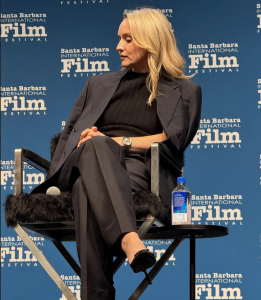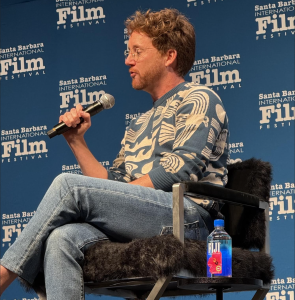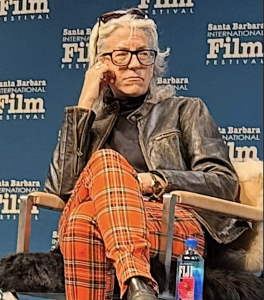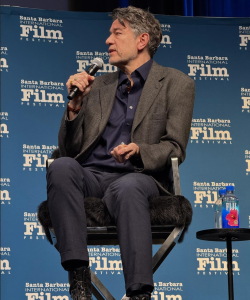“…except Mrs. Manny Davis.”
Autumn Russell (who plays Linda James) is still with us at age 95. Born on 1.3.30, she was 27 during the filming of Sweet Smell of Success. She also played a slave girl in Spartacus (’60).
“…except Mrs. Manny Davis.”
Autumn Russell (who plays Linda James) is still with us at age 95. Born on 1.3.30, she was 27 during the filming of Sweet Smell of Success. She also played a slave girl in Spartacus (’60).
I sat down with Noree Victoria‘s An Arrangement last night, and it didn’t do the thing. Not by my standards.
Co-written by Helen Shang and lead actress Bel Delia, it’s an odd three-hander about the wife of a gubernatorial candidate in rehab, and how her husband’s sexual interest in the assertive nurse threatens to disrupt the whole apple cart.
I immediately decided that I didn’t want to hang with Matt Dellapina‘s Lucas (smart and obsessive, but no charm or charisma — he’s certainly no Gavin Newsom) and Delia’s character, Violet (anxious, pissed off, weakened, downish).
I was intrigued by Jessica Damouni‘s Hannah, but at the same time I couldn’t figure her out. She exuded professional integrity, and didn’t seem like a woman who would consider fucking the husband of a patient.
The scene that tore it for me was when Dellapina begins to vaguely flirt with Hannah within earshot of his wife. Any guy who’s even thinking about possibly cheating on his wife always plays it carefully by making his move as far away from the wife as possible, and certainly out of earshot. But there Violet is, listening in from the other side of the door.
That was when I said “sorry but I don’t believe this movie, and I don’t like the characters enough to stick it out.” So I picked up my leather computer bag and slipped out of the theatre. Very sorry. Best of luck to everyone concerned with future endeavors. Cheers and respect.
It was a big deal at the RKO Pantages theatre when Vincente Minnelli‘s An American in Paris (’51) won the Best Picture Oscar on 3.20.52. It was also a surprise as it was widely presumed that A Streetcar Named Desire or A Place in the Sun would win.
Has any 21st Century film fanatic even thought about An American in Paris recently, much less seen it? The answer is no.
Nearly everyone, on the other hand, has seen Joseph L. Mankiewicz‘s All About Eve (’50), which won the Best Picture Oscar at the same location on 3.29.51. They also regard it quite highly.
Which recent Best Picture winners will be unseen and/or barely remembered 60 or 70 years hence? One such film is Everything Everywhere All At Once…guaranteed. Nobody wants to even think about it now. It was a huge embarassment when it won two years ago, and the shame will persist. The most merciful legacy will be for EEAAO to be forgotten entirely.
Who’s going to die in Joseph Kosinski‘s F1?
Whoever buys the farm (it almost certainly won’t be Damson Idris because black guys have to prevail these days), there’s no ambiguity about the fact that F1 is a total “guy movie.”
Brad Pitt, Idris, Kerry Condon, Tobias Menzies, Javier Bardem, etc.
Opening on 6.27.25, or a bit less than five months hence.
…for the obstinate “This Is Heavy, Doc” types and others who’ve been somehow unable to really see or feel Sean Baker’s film…



In the wake of Anora‘s two big wins last night…this is how that feels to me right now.
I used to routinely go boogie-boarding off the beach in Santa Monica in the ’80s and ’90s, but for some reason I stopped this ritual when the column got rolling in the late ’90s. I splashed around in the balmy Mediterranean when I visited Marina di Campo a quarter-century ago. Before today the last time I swam in the sea anywhere was at Jones Beach in ’06 or thereabouts.
An hour ago I strolled into the Pacific Ocean for the first time in decades, and the water was a shock to my system. Aaagghh! But it felt wonderful all the same. Because there I was, and the cold sensations were as real as it gets.


Every last Gold Derby handicapper but one picked The Brutalist‘s Brady Corbet to win the DGA top prize tonight, and he hasn’t! The GD know-it-alls were all wrong because Anora‘s Sean Baker has won it!
10:06 pm update: Anora has also won the Producers Guild Daryl F. Zanuck award….amazing! Pop the champagne!!
This means, of course, that Baker will almost certainly take the Best Director Oscar, and that Anora is now very well positioned to take the Best Picture Oscar as well.
On top of Anora‘s Critics Choice win last night, this is truly glorious news!



Brady Corbet is almost certainly wearing a long face right now. The pot-bellied director of HE’s least favorite film of the year has come up short, and all the angels in heaven are singing a joyful hymn composed by Miklos Rozsa.
Every HE commenter who’s been shitting on Anora and/or its Oscar chances needs to drop to his or her knees right now and kiss HE’s ass. You know who you are. Admit you were wrong…don’t hide your faces.
I find it hilarious that “This Is Heavy, Doc”, the pushiest, most full-of-toxic-conviction anti-Anora commenter in HE-land, hasn’t said a word so far. He’s hiding! He’s in shock!

Sean Baker, recipient of the DGA Award for Best Theatrical Feature Film (‘Anora’) | #DGAAwards pic.twitter.com/qPeAFKqrEM
— Deadline (@DEADLINE) February 9, 2025


Gold Derby wrongos!!



From Michael Schulman‘s “How the Oscar Race Got as Messy as Conclave” (The New Yorker, 2.6.25). Subhead: As in the movie, a succession of mini-scandals has threatened to derail one Best Picture contender after another.
“Stop me if you’ve seen this one. A committee of august personages convenes, with much pomp and circumstance, to choose the best of their lot. Time-honored rituals are observed. Fancy outfits are donned. The ogling public is kept at bay. The contenders, some representing progress, others tradition, jockey for supporters, though outright campaigning is frowned upon—and negative campaigning is taboo, although it happens in whispers. Unflattering rumors swirl, and the contestants are made to atone for their past sins. Secret ballots are cast and counted, in an arcane tallying system, and a victor is announced, to great fanfare.
“This is, roughly, the plot of Conclave, in which the College of Cardinals meets at the Vatican, after the death of the Pope, to choose his successor. But it’s also the plot of this year’s Oscar race, in which Conclave is nominated in eight categories, including Best Picture.
“When I first saw it, last fall, the film immediately reminded me of awards season, with its ceremonial customs, its flair, and the pettiness of its esteemed voting body. (For the red robes and skullcaps, sub in the red carpet.) Just as Oscar nominees go on endless press rounds to talk about their artistic process without evincing a hunger for the little gold man, the film’s papal hopefuls profess that their aspirations are spiritual. Still, ‘every cardinal, deep down, has already chosen the name by which he would like his papacy to be known,’ one character says in Conclave — just as every actor has, admittedly or not, delivered an Oscar speech in the shower.
“It wasn’t until the Oscar nominations were announced, two weeks ago, that awards season started to resemble Conclave where it counts: in sheer, soapy drama.
“As in the movie, a succession of mini-scandals has threatened to derail one Best Picture contender after another, amounting to one of the messiest campaign seasons in recent memory. In Conclave, the calculus shifts each time a disgraced cardinal drops out of the running. In the awards race, the question looms: Will any of the nominees make it to the ceremony untainted?”
HE answer: Yes….Anora! Anora is Cardinal Benitez!
Late this morning I attended a screenwriters panel discussion inside Santa Barbara’s Arlington theatre, which was moderated by IndieWire‘s Anne Thompson.
The honored screenwriters were Sing Sing‘s Clint Bentley, Nickel Boys‘ Joslyn Barnes, A Real Pain‘s Jessie Eisenberg, The Brutalist‘s Mona Fastvold, September 5‘s Tim Fehlbaum and Conclave‘s Peter Straughn.
The Best Adapted Screenplay Oscar should absolutely go to Conclave and to Mr. Straughn — easily the most eloquent, moving and memorable script.
Alas, nothing of real substance — artistically, politically, culturally — was discussed today. Thompson is no Bill Maher, and so she asked her usual boilerplate blah-blah questions, and the screenwriters answered them in a mild-mannered, “this is who I am and how I work and yaddah-yaddah” fashion, and it was basically a pleasant flatline experience.
I eventually decided that the only way to write about the panel with any intrigue was to discuss fashion choices. Because at the very least, the writers’ sartorial choices held my attention.
What Mr. Straughn wore was fine. Subdued blues, grays, blacks. No hiccups.
Mr. Bentley’s green-and-white pullover was chosen because he’s a flaming ginger and green blends well with red hair, but the splotchy white design was, for me, problematic. I recoiled the instant he walked on stage.
HE is opposed to The Brutalist, but Fastvold’s midnight blue pantsuit was perfect; ditto her shiny black pumps.
Ms. Barnes wore the very best pants (bright orange plaid).
Mr. Fehlbaum’s attire caused no problems, certainly not by my sights.




Cardinal Benitez’s speech to all the cardinals following the bomb blast: “I carried out my ministry in the Congo, in Baghdad and Kabul. I’ve seen the lines of the dead and wounded, Christian and Muslim.
“When you say we have to fight, what is it you think we’re fighting? You think it’s those deluded men who had carried out these terrible acts today? No, my brother. They’re small and petty. They’re only interested in themselves, in Rome, in the election and power. And those things are not the Church.
“The Church is not tradition. The Church is not the past. The Church is what we do in the future.”
It was so wonderful last night when Sean Baker‘s Anora won the Critics Choice Best Picture award…whoo-whoo! I love the idea of this notion carrying over to the Oscars, but there are so many Academy members who just aren’t smart or hip enough to understand that Anora really is the best or them all.
There are so many idiots out there who believe that a three-hour-plus movie with an overture and an intermission and shot in VistaVision…there are just too many stupid people out there who equate this kind of thing with greatness so it’s best not to get our hopes up.
From the same “Roberts Peaked in Serpico, Pelham” comment thread, also posted this morning…

HE reply: To have spoken the plain, unfettered truth about the many, many missteps of the Criterion Collection…my God, who else has had the stones and sand to do this with?
Over the years HE has righteously exposed (a) all of Criterion’s beyond-horrible Egyptian mosquito grainstorm Blurays (Stagecoach, The Awful Truth, The Third Man, His Girl Friday), (b) those grotesque, teal-tinted vandalism Blurays (Bull Durham, Teorema, Midnight Cowboy), (c) Criterion needlessly cleavering A Hard Day’s Night and Some Like It Hot from the pedestal of their healthy, breathing-room aspect ratios of 1.66:1 into the harsh a.r. realm of 1.75 and 1.85, respectively, (d) the mine-shafty, overly inky monochrome renderings of Only Angels Have Wings and Rebecca…the list goes on and on.
Have the Criterion bros fixed any of these errors, the teal vandalizing in particular? Not to my knowledge.
On top of which their social signature is odious. The Criterion crew is pretty much exactly like your snooty cool kidz in high school — chilly, elitist, obstinate snobs. They’re brilliant at sucking up to edge-factor filmmakers and going “coo, coo…we want to slurp your dirty bath water!”
On the other hand their highest quality Bluray/4K visual and compositional signature is second to none (I’ve acknowledged this from the get-go) and fully respected the world over.
And my praise for their game-changing On The Waterfront visual essay about the criminality of cleavering a film that was protected by dp Boris Kaufman at 1.37:1 and yet cropped down to 1.85…for this I will bow down to Criterion on bended knee for the rest of my life.
And I adore, adore, ADORE their wonderfully grain-free Sweet Smell of Success Bluray, not to mention their transportational Blurays of The Hit, Sunday Bloody Sunday and especially Barry Lyndon.
Recounting the saga once again, Criterion rejected Leon Vitali’s claim that Kubrick’s 1975 classic should have been cropped to 1.78:1 -— they corrected this error by cropping Lyndon at 1.66. And yet — and yet! — they failed to give credit to Glenn Kenny for un-earthing a letter (provided by Jay Cocks) that Kubrick sent to exhibitors specifying that the film should ideally be projected at 1.66…and they ignored my weeks-long, one-man-band campaign on behalf of that 1.66 aspect ratio…I was truly the coal fire that kept that engine going.
Nonetheless all hail Criterion for generally being on the side of the angels, not just on this front but many others. They just need to fix the grain, the teal and the aspect ratios on the above titles.
From the comment thread for “Roberts Peaked in Serpico, Pelham,” posted this morning…

HE reply: “How is a simple, from-the-heart statement of fact — Tony Roberts gave his finest, tastiest, grittiest supporting performances in a pair of early ‘70s cop dramas — how is that obviously respectful tribute ‘showing my ass’?
“To be able to stand up tall and say to the image in the bathroom mirror that you are a member in good standing of the fabled Serpico and The Taking of Pelham One Two Three clubs (and that’s quite the fraternity, quite the badge of honor)…what’s Marc Antony’s final line about Brutus in Julius Caesar? “This was a man!”
